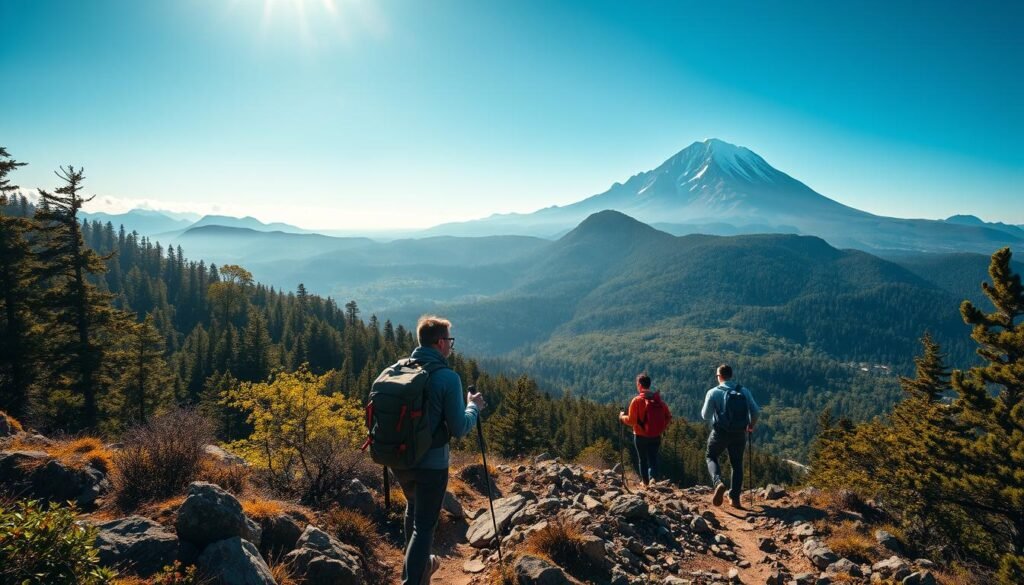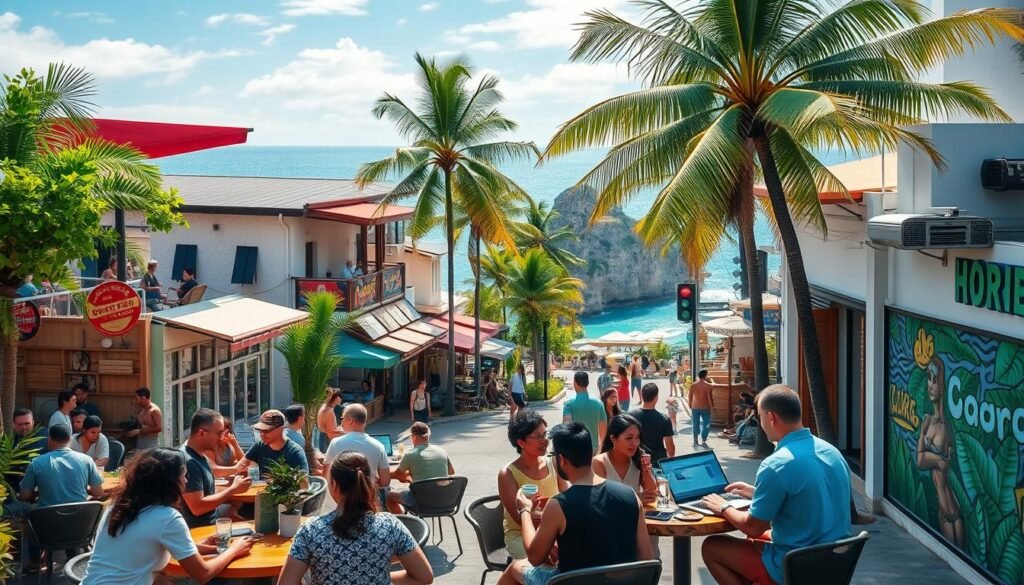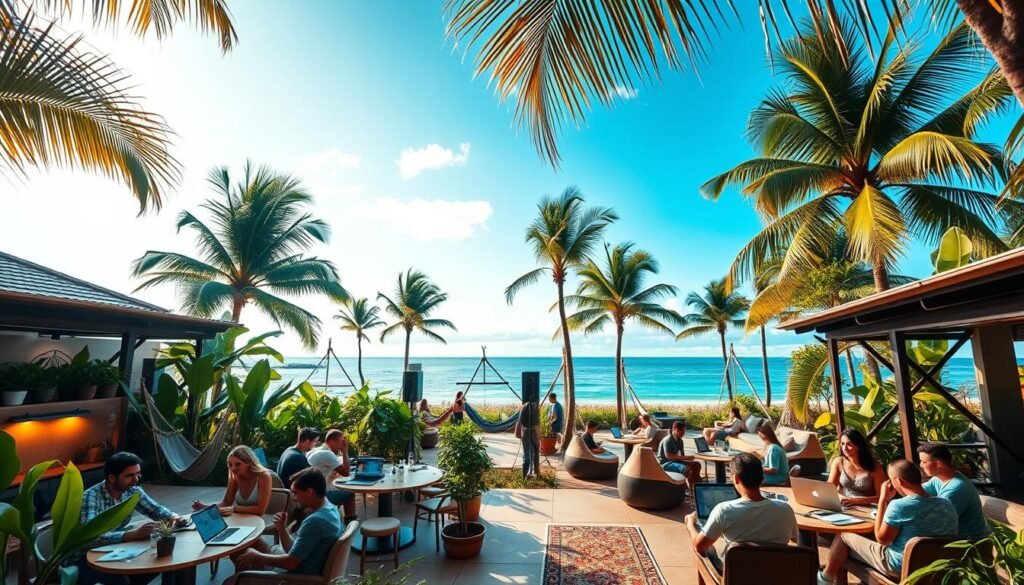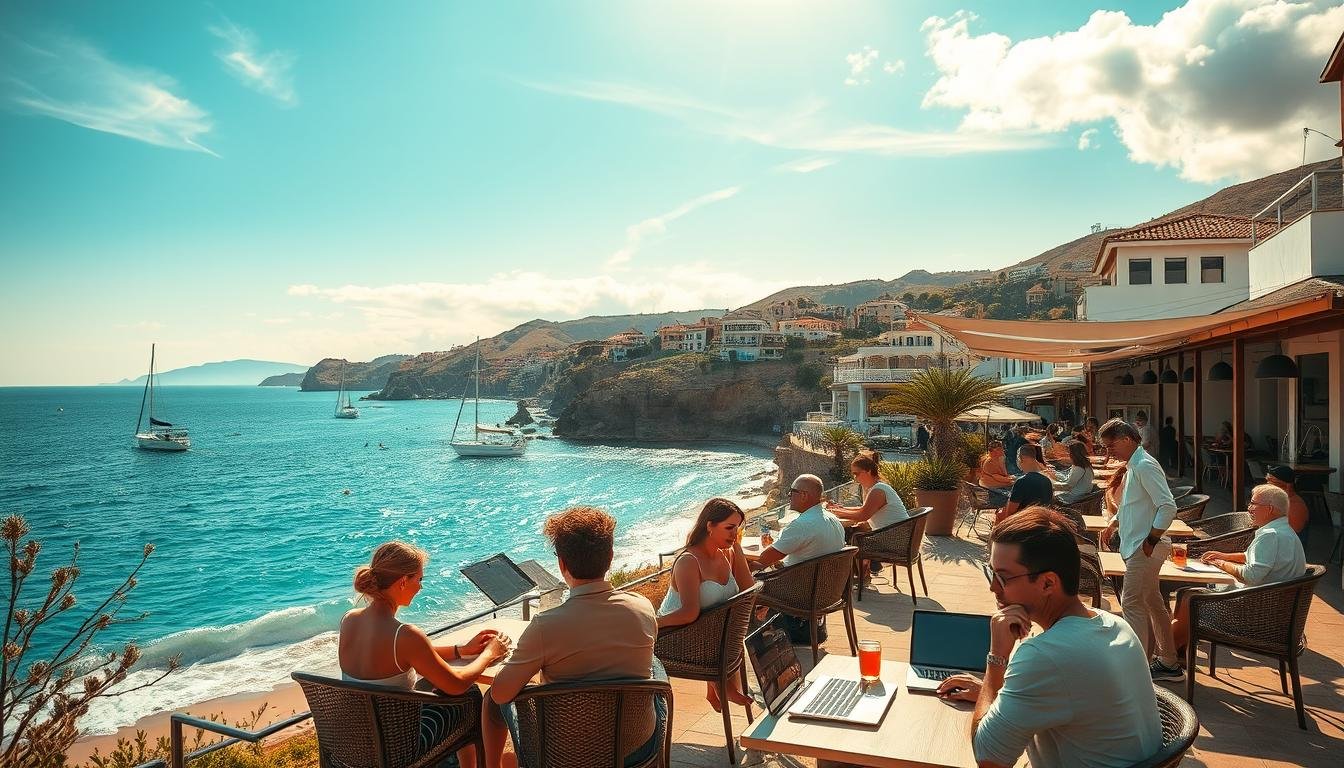Are you ready to leave behind the 9-to-5 job and see the world while keeping your career alive? Remote work travel is now a popular choice. It lets people enjoy new places and cultures without giving up their work goals.
You can live a life where the world is your office. This shift is part of a bigger trend. It’s called digital nomad passion tourism. Here, people mix their love for travel with work, making life more balanced and rewarding.
Key Takeaways
- Embracing a location-independent lifestyle offers the freedom to work from anywhere.
- Combining work and travel can lead to a more balanced and fulfilling life.
- The rise of remote work travel is changing the way we approach our careers and leisure time.
- Digital nomad passion tourism is on the rise, offering new opportunities for exploration and personal growth.
- This lifestyle allows for cultural immersion and new experiences.
Understanding Digital Nomadism
The rise of remote work has led to a new type of traveler: digital nomads. They mix the freedom to explore with the chance to keep a successful career. This is changing how we see work and travel.
Digital nomadism is more than a trend; it’s a lifestyle. It lets people have nomadic adventures while keeping up with work. Thanks to technology, working from anywhere is now possible with just an internet connection.
What It Means to Be a Digital Nomad
Being a digital nomad means living a flexible, independent life. They can work from anywhere, like coffee shops or beaches, as long as they have internet. This lifestyle design helps them balance work and fun, exploring new places and cultures.
Digital nomads work in many fields, like software development and writing. They use digital tools to stay in touch with clients and manage projects. This freedom lets them travel and experience the world without giving up their careers.
Key Characteristics of Digital Nomads
Digital nomads have traits that help them thrive in a location-independent life. They are adaptable, tech-savvy, and self-motivated. They can manage their time well, balancing work and travel.
- Flexibility: Ability to adjust to new environments and work schedules.
- Technological savvy: Proficiency in using digital tools for work and communication.
- Self-motivation: Discipline to manage work and leisure time effectively.
- Adaptability: Capacity to adapt to different cultures and lifestyles.
Understanding these traits shows digital nomadism is more than traveling. It’s a lifestyle that combines work, travel, and personal growth. As more people join, the community grows, offering support and resources for digital nomads.
Defining Passion Tourism
Passion tourism is about exploring activities that spark your passion. It’s about traveling to do things you love, making each trip special and rewarding.
What is Passion Tourism?
Passion tourism is traveling for activities or experiences you’re passionate about. It lets you dive into local cultures, hobbies, or new adventures. This way, you create unforgettable memories.
For example, you might want to visit places famous for their food, history, or outdoor activities. This type of tourism helps you connect deeply with the places you go.

Different Types of Passion Tourism
Passion tourism covers many interests and activities. Some popular ones include:
- Adventure Tourism: Trying exciting activities like hiking, diving, or skiing.
- Cultural Tourism: Visiting historical sites, museums, and local traditions.
- Eco-Tourism: Traveling in a way that supports conservation.
- Culinary Tourism: Exploring local food and cooking methods.
These categories let you customize your travel to fit your interests. This makes your trips more fun and meaningful.
Benefits of Passion Tourism
Passion tourism has many benefits, such as:
- Personal Growth: Learning new skills and becoming more confident through experiences.
- Cultural Immersion: Understanding local cultures and communities better.
- Networking Opportunities: Meeting people who share your passions.
Traveling for your passions can make your trips more fulfilling and enriching.
The Intersection of Digital Nomadism and Passion Tourism
Digital nomadism is growing, blending work, travel, and passion. This mix lets people explore new places, do what they love, and keep working. It’s a unique lifestyle.
Digital nomads are more than remote workers. They dive into local cultures and experiences. For example, a photography lover might travel to capture the Grand Canyon’s sunrise or Tokyo’s street life.
How Digital Nomads Engage in Passion Tourism
Digital nomads tailor their travels to their interests. They might join local festivals, learn new skills, or visit historical sites. Remote work lets them take breaks for fun and fulfillment.
Examples of passion tourism activities include:
- Attending music festivals like Coachella or Tomorrowland
- Participating in culinary classes to learn local cuisine
- Visiting historical or cultural landmarks
- Engaging in outdoor activities such as hiking, surfing, or skiing
Anthony Licata, a digital nomad and travel blogger, said, « The beauty of being a digital nomad is that you can curate your life around your passions, whether that’s through work or play. » Many have found success blending work, travel, and interests.
« The world is a book, and those who do not travel read only one page. » – Saint Augustine
Case Studies: Success Stories of Digital Nomads
Many digital nomads have found a balance between work and play. For instance, Sarah Jones left her corporate job to travel and blog. She explores new places and enjoys scuba diving and yoga.
Mark Davis combines his love for photography with his digital nomad work. He travels to unique spots, capturing stunning images to sell online. This way, he turns his passion into income.
These stories show how digital nomads can lead fulfilling lives. By using their skills and interests, they make their travels meaningful and enriching.
Popular Destinations for Digital Nomad Travelers
Many digital nomads choose places that mix culture, adventure, and work. They look for spots with good internet, comfy workspaces, and chances to follow their passions.
Top Cities Embracing Digital Nomadism
Cities like Chiang Mai, Thailand, and Medellín, Colombia, are digital nomad favorites. They have a lively culture, a big expat community, and the tools for remote work. Chiang Mai, for example, is known for its low cost of living, tasty food, and many coworking spots.

In Chiang Mai, you can do lots of things like visit ancient temples and join local festivals. The city also has events and meetups for remote workers. This makes it easy to meet new people and make friends.
Unique Locations for Passion Tourism Enthusiasts
For those wanting more than just work, there are unique locations for passion tourism. Bali, Indonesia, and Costa Rica are great for mixing work with adventure and relaxation. In Bali, you can surf, do yoga, or explore the island’s culture.
Looking for nomadic adventures or a place to relax? Destinations like these offer the best of both worlds. They let you stay productive while enjoying new experiences and beautiful places.
The Role of Technology in Passion Tourism
Technology is key for the digital nomad lifestyle. It makes it easy to travel and work remotely. This way, people can explore new places and do things they love.
Essential Tools for Digital Nomads
Digital nomads need tech tools to stay productive and connected. These include:
- Project Management Software: Tools like Trello and Asana help manage projects and work with team members worldwide.
- Communication Platforms: Apps like Slack and Zoom make talking and meeting virtually easy.
- Travel Planning Apps: Apps like Google Trips and TripIt help plan trips and book places to stay.
A recent survey found that
« 71% of digital nomads think technology is key for remote work and balance. »
This shows how important the right tech tools are for digital nomads.
How Technology Facilitates Passion Tourism
Technology does more than just support remote work. It also makes passion tourism better. For example:
| Technology | Application in Passion Tourism |
|---|---|
| Virtual Reality (VR) | VR lets tourists see places and experiences before they book. |
| Social Media | Social media is where digital nomads share their adventures and find new places. |
| Travel Blogs and Forums | Travel blogs and forums give tips and advice from seasoned travelers, helping plan trips. |
By using these technologies, digital nomads can live a life that’s both fulfilling and exciting.
Building a Lifestyle Around Travel and Work
The digital nomad lifestyle is more than just traveling. It’s about finding a balance between work and seeing new places. You’ll need to figure out how to manage your work while still exploring.
Balancing Work and Exploration
To find a balance, create a routine that fits you. This might mean setting specific work hours, even in new places. This way, you can meet your work needs without missing out on exploration.
Tips for Balancing Work and Exploration:
- Set clear work hours and stick to them.
- Use productivity tools to stay organized.
- Schedule time for exploration and relaxation.
Creating a Travel Budget
Having a realistic travel budget is key for a digital nomad. You need to think about travel costs, accommodation, living expenses, healthcare, and other financial needs.
| Expense Category | Monthly Cost | Annual Cost |
|---|---|---|
| Accommodation | $800 | $9,600 |
| Food and Dining | $500 | $6,000 |
| Transportation | $200 | $2,400 |
| Healthcare and Insurance | $150 | $1,800 |
| Total | $1,650 | $19,800 |
Plan your budget well and track your spending. This way, you can enjoy the digital nomad lifestyle without worrying about money.

Keep being flexible and adaptable as a digital nomad. Balancing work and travel will make your experiences better and improve your well-being.
Challenges Faced by Digital Nomads in Passion Tourism
Starting your digital nomad journey comes with many challenges. You’ll face issues that can affect your passion tourism experiences. The freedom to explore new places is great, but you’ll also need to deal with complex rules and find supportive communities.
Navigating Visa and Work Regulations
One big challenge is dealing with visa and work rules in other countries. Each country has its own rules, so it’s important to know them well. This helps you avoid legal trouble.
Some places have special visas for digital nomads. Others might need you to get a work permit or register with local officials. Knowing these rules is key for a legal stay.
| Country | Visa Requirements for Digital Nomads | Work Permit Requirements |
|---|---|---|
| Thailand | Tourist visa or Smart Visa | Not required for remote work |
| Spain | Non-Lucrative Visa | Required for certain types of work |
| Indonesia | Social Visa or Limited Stay Visa | Required for working with local companies |
Finding Community on the Road
Finding a community as a digital nomad can be tough. Passion tourism can feel lonely, especially if you’re doing something unique. This can make it hard to connect with others.
To find community, many digital nomads use online forums and social media. They also go to events and meetups for digital nomads. This helps them meet others and build relationships.

By knowing the challenges and using the right resources, you can enjoy your digital nomad journey. It’s all about navigating the complexities and finding support along the way.
The Future of Digital Nomadism
The future of digital nomadism is set to change how you work and travel. It combines remote work with passion tourism, offering new ways to see the world and have a fulfilling job.
Trends in Remote Work and Travel
Remote work is changing fast, thanks to new tech and shifts in the workforce. Expect more flexible jobs, virtual reality tools, and a focus on enjoying life and work.
- Increased flexibility: More companies let you work from anywhere.
- Virtual reality integration: VR will make remote meetings and work more real.
- Wellness-focused work environments: Workspaces are now about your health, whether at a co-working spot or a beach.
As remote work grows, so does the nomad community. This growth brings new places and experiences to passion tourism.
Predictions for Passion Tourism Growth
Passion tourism will keep rising, thanks to experiential travel and wanting to connect with local cultures. Expect more in eco-tourism and cultural heritage tourism.
| Trend | Description | Impact on Digital Nomads |
|---|---|---|
| Sustainable tourism | Traveling in a way that’s good for the planet | More green places to stay and visit |
| Cultural immersion | Getting to know local cultures and people | Chances for real cultural sharing |
| Adventure tourism | More outdoor and exciting activities | More fun things to do while traveling |
When planning your next trip, think about the trends in digital nomadism and passion tourism. Stay updated to enjoy the latest opportunities in this exciting field.
Tips for Aspiring Digital Nomads
Thinking about a location-independent lifestyle? It’s more than just wanting to work and travel. You need specific skills and a solid plan.
Essential Skills for Success
To do well as a digital nomad, you must be adaptable, self-motivated, and good at managing time. Adaptability helps you adjust to new cultures and work settings. Self-motivation keeps you on track and productive, no matter where you are.
- Time management: Balancing work and exploration.
- Communication: Staying in touch with clients and team members remotely.
- Problem-solving: Overcoming challenges in unfamiliar environments.
Resources for Planning Your Journey
There are many resources to help you plan your digital nomad life. Online communities like Nomad List and Digital Nomads Forum share tips from seasoned nomads. Sites like Remote.co and We Work Remotely list remote jobs, helping you find work that lets you travel.
When planning, think about visas, health insurance, and your budget. Also, research places and learn about local cultures. This will make your location independent lifestyle more fun and rewarding.
The Impact of Passion Tourism on Local Economies
Passion tourism is changing local economies in big ways. It offers both chances and hurdles. When you travel and work, knowing how you affect the places you go is key.
Benefits for Host Communities
Passion tourism can help host communities a lot, including:
- Economic Boost: Your support of local businesses helps the economy grow and stay strong.
- Cultural Exchange: Sharing cultures with locals makes everyone richer, building respect and understanding.
- Infrastructure Development: More tourists can mean better roads, public spaces, and services for everyone.
Responsible Travel Practices
To make sure your travels help the local community, follow these tips:
- Support Local Businesses: Pick places to stay, eat, and shop that are owned by locals.
- Respect Local Customs: Learn and follow the local ways of life and traditions.
- Minimize Your Impact: Use public transport, recycle, and save water to lessen your environmental effect.
Traveling responsibly means you help the places you visit. This way, you and the locals can both have a great time.
Creating Lasting Memories while Traveling
Starting your digital nomad journey means capturing your experiences. The places you see, people you meet, and challenges you face all make up your travel story. These memories can inspire and motivate you long after you’ve traveled.
Capturing Your Nomadic Adventures
To really capture your wanderlust experiences, use different methods. Photography is great for freezing moments. Try to take photos of the local culture, landscapes, and cityscapes.
Keeping a travel journal is also helpful. It lets you record your thoughts, feelings, and reflections. Storytelling through writing, video, or social media is another way to share your travels.
Sharing Your Journey with Others
Sharing your experiences with others can be rewarding. It helps you connect with others and inspire them to travel. Use social media, blogs, and video channels to share your stories.
When you share, make sure your content is engaging. Highlight the unique parts of your journey and the lessons you’ve learned.
« The world is a book, and those who do not travel read only one page. »
Sharing your travel stories enriches others and helps you reflect on your journey. It celebrates the diversity and complexity of yourlifestyle design.
By capturing and sharing your travel experiences, you join a community that values exploration and personal growth. Your stories can motivate and inspire others, whether through a blog post, video, or social media update.
Conclusion: Embracing the Digital Nomad Lifestyle
Digital nomadism and passion tourism mix freedom with fulfillment. By choosing remote work travel, you can see new places, meet interesting people, and live where you love. This lifestyle lets you follow your passions wherever you go.
Passion as a Driving Force
Passion is key in tourism, pushing people to discover new places and have deep experiences. As a digital nomad, your love for travel and work makes your life richer. You get to connect with locals and make memories that last a lifetime.
Final Inspiration
Thinking about starting this journey? Remember, it’s not just about traveling. It’s about living a life that matches your values and dreams. With the right attitude and tools, you can open up a world of opportunities. You’ll find joy and fulfillment in your remote work travel adventures.
FAQ
What is a digital nomad?
A digital nomad works remotely and travels to different places. They use technology to stay in touch with work and friends. This lifestyle lets them work from anywhere.
What is passion tourism?
Passion tourism is traveling to do things you love. It can be adventure, culture, or nature. It’s about exploring places that excite you.
How do digital nomads balance work and travel?
Digital nomads are flexible with their time. They use tools to stay organized. They choose places with good internet and a friendly community.
What are some popular destinations for digital nomads?
Digital nomads like Chiang Mai, Thailand; Medellín, Colombia; and Lisbon, Portugal. Places like Bali and Costa Rica are also popular. They offer culture, beauty, and modern comforts.
How do digital nomads stay connected with others while traveling?
They use social media and online groups. They also join coworking spaces and events. This helps them meet others who share their lifestyle.
What are some challenges faced by digital nomads?
They face visa issues, finding reliable internet, and balancing work and fun. They might also feel lonely or disconnected from home.
How can I become a digital nomad?
You need skills like writing, designing, or coding. Be flexible, self-motivated, and open to new places and cultures.
What are some essential tools for digital nomads?
They use Trello or Asana for work. Zoom or Slack for talking. And Nomad List or Google Trips for planning trips.
How can digital nomads engage in responsible travel practices?
They should respect local cultures and environments. Support local businesses. And try to leave a small footprint where they visit.
What is the future of digital nomadism?
The future will be shaped by remote work, tech, and tourism trends. More people will travel and work remotely. We’ll see new places and challenges.





